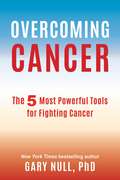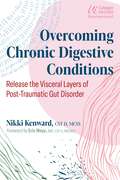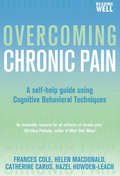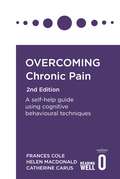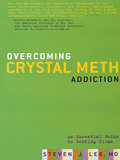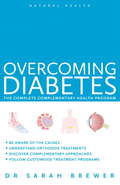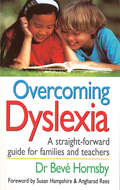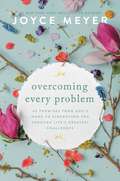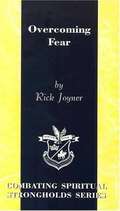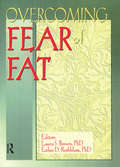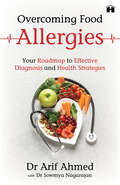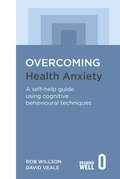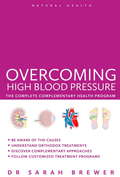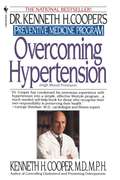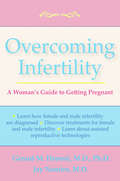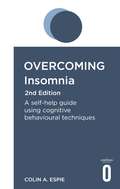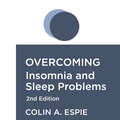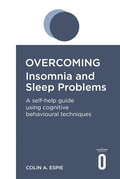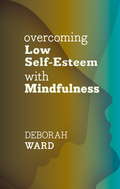- Table View
- List View
Overcoming Cancer: The 5 Most Powerful Tools for Fighting Cancer
by Gary NullOne word strikes more fear into a person’s mind than any other: cancer. The physical, mental, emotional, and financial toll that comes with a cancer diagnosis is immense and affects not only cancer patients but also families and entire communities. The vast majority of individuals who lose the battle against cancer are treated with the standard orthodox therapy. These people may never have questioned their oncologists, believing that they were in the best possible hands with their physicians’ advanced education, their knowledge of the latest treatments, and all the tools of modern research at their disposals.In Overcoming Cancer, Gary Null explores the alternative treatments that most mainstream doctors will never discuss with their patients. Did you know that eating melons balances your body’s pH, which can help slow the growth of cancer? You were aware that fiber is an important part of a healthy diet, but did you know that it lowers the risk of breast, colorectal, uterine, and prostate cancers? Find health and vitality with Dr. Null’s five most powerful tools for fighting cancer.
Overcoming Chronic Digestive Conditions: Release the Visceral Layers of Post-Traumatic Gut Disorder
by Nikki KenwardA holistic approach for healing trauma stored in the gut• Explains how and why emotions and trauma are stored in the gut, causing digestive issues and visceral tensions • Presents recent research that enriches our understanding of the gut as a center of emotional and spiritual growth • Shares a hands-on process of listening to the gut layer by layer to help heal gut issues, renew the microbiome, and release intergenerational trauma A healthy gut is fundamental to a healthy life. Embedded within our digestive system is the enteric nervous system, our &“second brain,&” which serves to protect us from the external world of adversity, including not only viruses and bacteria, but also traumatic events. As Nikki Kenward, CST-D, MCSS, explains, past challenges and traumas, whether emotional or physical, are held in the enteric nervous system in many ways, including fascial tension, cellular changes, and unhelpful &“default settings.&” Exploring in depth what she calls &“the Post-Traumatic Gut,&” Kenward describes the anatomy and physiology of the enteric nervous system, including the polyvagal system, and the many ways that our emotional history and current emotional state can impact our digestive system. Sharing recent research, she describes the science behind the emotional gut and how to apply it to chronic digestive issues like IBS and Crohn&’s disease as well as mental health issues such as anorexia, bulimia, anxiety, and depression. She explains how and why the digestive gut absorbs emotions and what you can do to heal its functions by addressing psychosomatic stressors, rather than just nutrition. Presenting case studies from her 25 years in clinical practice as well as her own healing journey, she reveals the synchronicity between digestive/metabolic functions and psychological/perceptual insight and how allowing the cells to &“speak&” through bodywork such as CranioSacral Therapy and SomatoEmotional Release Therapy can help renew the microbiome of the second brain, release intergenerational trauma and illness, and restore one&’s psychospiritual life. Sharing visualization exercises and a hands-on process of listening to the gut layer by layer, the author helps readers unwind stagnant cellular patterns, discover the dynamic intelligence in every cell, and transform Post-Traumatic Gut into Post-Traumatic growth.
Overcoming Chronic Pain: A Books on Prescription Title (Overcoming Ser.)
by Helen Macdonald Frances Cole Catherine Carus Hazel Howden-LeachA clinically proven self-help approach to pain management.
Overcoming Chronic Pain 2nd Edition: A self-help guide using cognitive behavioural techniques
by Frances Cole Helen Macdonald Catherine CarusTake control of your life, take control of your painChronic pain can be extremely debilitating; however, it does not need to dominate your life. This self-help book is based on highly effective self-help methods developed by specialists and used in community and hospital pain management programmes. Your experience of pain can be greatly reduced by pacing daily activities, reducing stress, learning relaxation techniques and effective ways to cope with depression, anxiety, worry, anger and frustration.This easy-to-follow book sets out:- Why pain can persist when there's no injury or disease present- How to become fitter and pace your activities- Practical ways to improve sleep and relaxation- Tips for returning to work, study and gaining a life you valueOvercoming self-help guides use clinically proven techniques to treat long-standing and disabling conditions, both psychological and physical.This book is recommended by the national Reading Well scheme for England delivered by The Reading Agency and the Society of Chief Librarians with funding from Arts Council England and Wellcome.
Overcoming Chronic Pain 2nd Edition: A self-help guide using cognitive behavioural techniques (Overcoming Books)
by Helen Macdonald Catherine Carus Dr. Frances ColeTake control of your life, take control of your painChronic pain can be extremely debilitating; however, it does not need to dominate your life. This self-help book is based on highly effective self-help methods developed by specialists and used in community and hospital pain management programmes. Your experience of pain can be greatly reduced by pacing daily activities, reducing stress, learning relaxation techniques and effective ways to cope with depression, anxiety, worry, anger and frustration.This easy-to-follow book sets out:- Why pain can persist when there's no injury or disease present- How to become fitter and pace your activities- Practical ways to improve sleep and relaxation- Tips for returning to work, study and gaining a life you valueOvercoming self-help guides use clinically proven techniques to treat long-standing and disabling conditions, both psychological and physical.This book is recommended by the national Reading Well scheme for England delivered by The Reading Agency and the Society of Chief Librarians with funding from Arts Council England and Wellcome.
Overcoming Crystal Meth Addiction: An Essential Guide to Getting Clean
by M. D. Steven J. LeeIn Overcoming Crystal Methamphetamine Addiction, one of the few books to address the topic for a general audience, Dr. Steven Lee, MD, a psychiatrist who specializes in crystal meth addiction, offers a complete guide to the drug, its effects, and how to overcome it. Based on extensive scientific and social research and drawing from his professional experience, he covers everything from the definition and history of crystal meth to the physical and psychological effects; from dealing with the addictive personality to helping a friend or family member cope with it. He focuses on understanding rather than outright condemnation of the drug, and empathetically covers all of the crucial questions: What is crystal meth? How is it made? How does it affect the body? How do you know if you're addicted to it? How do you stop using it? What if you don't want to stop? If you are going to use CM anyway, how can you minimize the damage? What if you quit but slipped and used again?
Overcoming Diabetes
by Dr Sarah BrewerDiscover a unique complementary health program from medical expert Dr Sarah Brewer that will help you tackle diabetes and make a real difference to your health and quality of life.
Overcoming Diabetes
by Dr Sarah BrewerDiscover a unique complementary health program from medical expert Dr Sarah Brewer that will help you tackle diabetes and make a real difference to your health and quality of life.
Overcoming Diabetes
by Dr Sarah BrewerDiscover a unique complementary health program from medical expert Dr Sarah Brewer that will help you tackle diabetes and make a real difference to your health and quality of life.
Overcoming Dyslexia
by Dr Beve HornsbyDyslexia is a common diagnosable condition that is estimated to affect at least one child in ten. In its most usual form it is manifested as a difficulty in learning to read and write, but it is widely misunderstood and often mistaken for low intelligence or even laziness. Dr Beve Hornsby combines her experience as a psychologist, teacher and speech therapist in this informative and reassuring book for parents and teachers of children suffering from a disability no-one can see or understand, and offers advice on how to identify, tackle and eventually overcome dyslexia. Includes up-to-date information on Attention Deficit Disorder and the relevance of the latest Education Act.
Overcoming Every Problem: 40 Promises from God's Word to Strengthen You Through Life's Greatest Challenges
by Joyce MeyerNew York Times bestselling author Joyce Meyer guides you through 40 promises in the Bible so that no matter what problem you face, you have God&’s ultimate wisdom to overcome it! Everyone has problems. But throughout more than 45 years of studying God&’s Word, Joyce Meyer has learned how to find the answer for every problem you face in the Bible–and she wants to share it with you. In Overcoming Every Problem, Joyce helps you gain the ultimate wisdom you need when challenges arise. No matter how big or how deep the pain of your situation, you&’ll be encouraged and inspired to trust God for better days ahead. Join Joyce on your journey to put God&’s promises to work in your life, so you can overcome every problem you must face!
Overcoming Fear
by Rick JoynerThere Is no fear in love; but perfect love casts out fear (I John 4:18) The Battle for the Soul of Man In these last days the battle raging for the soul of man is intensifying dramatically. This battle is being fought in every individual, every church. every city, and every nation. If we do not understand this conflict we will be defeated. This booklet is to help illuminate and tear down one of the most powerful weapons that the enemy of our souls is using to keep man in bondage to his evil ways. That weapon is FEAR!
Overcoming Fear of Fat
by Esther D Rothblum Laura BrownHere is an enlightening new volume that presents an integration of anti-fat-oppressive attitudes into the work of feminist therapy. Overcoming Fear of Fat is unique among professional work in the area of women and fat in that it does not approach size as the problem; rather it approaches prejudice against fat as the problem. Although for nearly a decade, fat activists have been raising the issues that are confronted in this book, therapists, including feminist therapists, have been colluding with their clients in pathologizing fat, celebrating weight loss, and failing to adequately challenge cultural stereotypes of attractiveness for women, instead of empowering clients and encouraging them to take on expert authority about their own experiences. The contributors, including therapists and fat activists, aim to disconnect the issues of food intake and eating disorders from those of weight. They share personal and professional experiences of challenging fat oppression, offer strategies for therapists to rid themselves and their clients of fat oppressive attitudes, and most importantly, they confront long-held cultural myths that fat is unhealthy, and that fat women are physically unfit and are in hiding from their sexuality or personal power. A practical and informative resource for therapists, especially those who work with fat women or who themselves struggle with issues of feeling critical of their own body size, Overcoming Fear of Fat will also be a valuable guide for fat women who wish to feel supported in their struggle for self-worth and respect.
Overcoming Food Allergies: Your Roadmap to Effective Diagnosis and Health Strategies
by Dr. Arif AhmedThis book is timely and will serve as a tool for all the stakeholders and the public to effectively prevent and manage food allergies.– Dr Hemalatha R.With the advent of industrialisation followed by the information revolution, the world has witnessed a complete reshaping of general lifestyle, especially dietary habits. These seismic changes not only encompass the type of food consumed but also the way it&’s produced, prepared, and stored, leading to a staggering increase in food allergies on a global scale.So far, India has remained relatively immune to this epidemic, mainly due to the preservation of traditional food habits, particularly in the non-metropolitan regions. However, as development surges forward and the Western lifestyle is more rapidly adopted, this immunity is gradually waning.Dr Arif Ahmed, a noted allergist and paediatrician, has taken the lead in raising awareness about the impending crisis of food allergies. In his new book, he tackles this pressing issue head-on and offers invaluable insights into prevention and management strategies to effectively combat food allergies.All in all, Overcoming Food Allergies is a comprehensive and empowering medical guide as well as a beacon of hope for a vast population in South Asia.
Overcoming Gravity: A Systematic Approach to Gymnastics and Bodyweight Strength
by Steven LowSteven Low takes the reader on a journey through logically constructing a strength-oriented bodyweight workout routine. With a highly systematic approach, he delves into the physiology behind strength training and equips the reader to adequately prepare their body for the rigors of bodyweight training. This book covers much ground that other books do not, offering information on health and injury management, factors that contribute to a successful routine, and actual program implementation.
Overcoming Health Anxiety: A self-help guide using cognitive behavioural techniques
by David Veale Rob WillsonStop worrying about your health and enjoy life.Many of us have a tendency to worry unnecessarily about our health. This can be worse in a time of global panic about pandemics. For some, the anxiety becomes chronic, and they may spend many hours checking for symptoms, seeking reassurance from others, surfing the internet for information about different diseases, or repeatedly visiting the doctor. It is distressing for them and for everyone around them.In fact, health anxiety can be very successfully treated with cognitive behavioural therapy - the approach taken in this self-help guide. Using a structured, step-by-step approach, the authors explain how the problem develops, how to recognise what feeds it and how to develop effective methods of dealing with it.- Includes questionnaires, case studies and exercises- Based on proven CBT techniques- Includes a chapter on fear of death and fear of vomiting
Overcoming High Blood Pressure
by Sarah BrewerDistinguished doctor and internationally best-selling author Sarah Brewer presents this unique book, which provides a highly authoritative yet easy-to-follow program of complementary medicine and self-care treatments, specially designed to support the conventional treatment for high blood pressure. If you are one of the millions (10 million in the UK alone) who have this condition, and are looking for an expert to guide you through all the positive steps you can take to enhance your health and well-being, this is the book for you. Dr Sarah Brewer offers a pioneering approach of tailor-made programs, based on the premise that we're all unique and have different requirements. Complete the questionnaire in Part 3, and you'll see whether to embark upon the gentle, moderate or full-strength program. Each program offers daily menu plans, as well as exercise routines and techniques from complementary medicine - all of which will empower you to take control and make real, long-lasting changes to your health. * Understand what your doctor is prescribing you and why. * Discover complementary therapies you can use to support conventional treatments. * One ot of every three Americans suffers from high blood pressure (that's 77.9 million people). * Dr. Sarah Brewer is a top expert in the field of combined complementary and conventional medicine. * Clearly focused book, with practical programs throughout and first-class photography and design. * Fully endorsed by the Complimentary Medical Association.
Overcoming Hypertension: Preventive Medicine Program (Dr. Kenneth H. Cooper's Preventive Medicine Program)
by Kenneth H. CooperLike a time bomb ticking away, hypertension builds quietly, gradually, placing unbearable strain on the body until it explodes--in heart attack, stroke, kidney failure, arterial disease, even death. But the disease does not have to progress that way. Here, in the third volume of the highly acclaimed Preventive Medicine Program, Dr. Kenneth H. Cooper, one of the nations foremost experts in the field of preventive medicine, presents a medically sound, reassuringly simple program that help you lower you blood pressure--and keep it down, often without drugs. Overcoming Hypertension gives you:--The latest facts on how cholesterol, cigarette smoking, obesity, and stress affect coronary risk levels.--Your high blood pressure risk profile, with newly devised charts for men and women.--A complete fitness program that lets you choose the sport that works for you. Plus a unique illustrated guide to aqua-aerobics.--Tips on talking to your doctor that will help you become an active participant in your own recovery.--A guide to anti-hypertensive drugs--the most up-to-date list of medications, their recommended daily doses, and ways to minimize side effects.--Three distinct dietary programs, complete with menus, recipes, nutritional charts, healthy cooking tips, and much more.--Take charge of your health and well-being with Overcoming Hypertension.From the Paperback edition.
Overcoming Infertility: A Woman's Guide to Getting Pregnant
by Gerard M Honoré Jay NemiroConfronting a problem that affects one out of 10 American couples, this all-inclusive, question-and-answer guide offers insight and encouragement in the face of infertility. Addressing the deep disappointment and emotional distress that accompany a diagnosis, this resource emphasizes that there is still hope regarding this daunting condition. Penned by a reputable endocrinologist who has treated thousands of couples, this helpful reference provides a way to navigate through a confusing time, clearly illustrating the most suitable treatment options. Topics covered include the causes of both female and male infertility, how to cope emotionally with a diagnosis, and utilizing the new Assisted Reproductive Technologies (ART). From choosing a fertility specialist to taking advantage of the most recent developments, this exhaustive study provides practical guidance for couples facing this overwhelming syndrome.
Overcoming Insomnia 2nd Edition: A self-help guide using cognitive behavioural techniques
by Colin Espie'A practical description of the leading treatment for insomnia and the causes of insomnia' Allison G. Harvey, PhD, University of California, Berkeley, USAPoor sleep is one of the most common health problems and can leave you feeling exhausted, stressed and run down. While prescribed medications and over-the-counter remedies rarely offer lasting benefits, cognitive behavioural therapy (CBT) can help.This essential self-help book is written by one of the world's leading insomnia experts and uses CBT strategies to help you to overcome sleep problems - including persistent insomnia - and to enjoy your life once again. It includes advice on:- Developing good pre-bedtime regimes- The most effective relaxation techniques- Establishing a new sleeping and waking pattern- Dealing with a racing mind- Using sleeping pills more effectively- Handling jet lag and sleepwalkingOvercoming self-help guides use clinically-proven techniques to treat long-standing and disabling conditions, both psychological and physical.Series Editor: Emeritus Professor Peter Cooper
Overcoming Insomnia 2nd Edition: A self-help guide using cognitive behavioural techniques
by Colin Espie'A practical description of the leading treatment for insomnia and the causes of insomnia' Allison G. Harvey, PhD, University of California, Berkeley, USAPoor sleep is one of the most common health problems and can leave you feeling exhausted, stressed and run down. While prescribed medications and over-the-counter remedies rarely offer lasting benefits, cognitive behavioural therapy (CBT) can help.This essential self-help book is written by one of the world's leading insomnia experts and uses CBT strategies to help you to overcome sleep problems - including persistent insomnia - and to enjoy your life once again. It includes advice on:- Developing good pre-bedtime regimes- The most effective relaxation techniques- Establishing a new sleeping and waking pattern- Dealing with a racing mind- Using sleeping pills more effectively- Handling jet lag and sleepwalkingOvercoming self-help guides use clinically-proven techniques to treat long-standing and disabling conditions, both psychological and physical.Series Editor: Emeritus Professor Peter Cooper
Overcoming Insomnia 2nd Edition: A self-help guide using cognitive behavioural techniques (Overcoming Books)
by Colin EspieA Books on Prescription TitleAll the help you need to conquer your sleep problems and start living life to the fullPoor sleep is one of the most common health problems and can leave you feeling exhausted, stressed and run-down. While prescribed medications and over-the-counter remedies rarely offer lasting benefits, Cognitive Behavioural Therapy can help enormously and is the treatment of choice for insomnia.Develop good pre-bedtime routines.The most effective relaxation techniques.Establish a new sleeping and waking pattern.Deal with a racing mind.Use sleeping pills more effectively.Handle jet lag and sleepwalking.
Overcoming Insomnia and Sleep Problems: A self-help guide using cognitive behavioural techniques (Overcoming Ser.)
by Colin EspieAll the help you need to conquer your sleep problems and start living life to the full. Poor sleep is one of the most common health problems and can leave you feeling exhausted, stressed and run-down. While prescribed medications and over-the-counter remedies rarely offer lasting benefits, Cognitive Behavioural Therapy can help enormously and is the treatment of choice for insomnia.Develop good pre-bedtime routines.The most effective relaxation techniques.Establish a new sleeping and waking pattern.Deal with a racing mind.Use sleeping pills more effectively.Handle jet lag and sleepwalking.
Overcoming Insomnia and Sleep Problems: A self-help guide using cognitive behavioural techniques (Overcoming Books)
by Colin EspieA Books on Prescription TitleAll the help you need to conquer your sleep problems and start living life to the fullPoor sleep is one of the most common health problems and can leave you feeling exhausted, stressed and run-down. While prescribed medications and over-the-counter remedies rarely offer lasting benefits, Cognitive Behavioural Therapy can help enormously and is the treatment of choice for insomnia.Develop good pre-bedtime routines.The most effective relaxation techniques.Establish a new sleeping and waking pattern.Deal with a racing mind.Use sleeping pills more effectively.Handle jet lag and sleepwalking.
Overcoming Low Self-Esteem with Mindfulness
by Deborah WardBy working on self-esteem with the tools of mindfulness, this book offers readers the freedom to break out of unconscious thought habits which dictate unsatisfactory lives and to achieve real freedom and fulfilment.Perhaps no other self-help topic has spawned so much advice and so many conflicting theories as self-esteem. It’s like salt – a little gives flavour, strength and coherence to our personalities, while lack of it leads to an anodyne life of putting up with abusive situations or relationships, leading to depression and lack of fulfilment. On the other hand, too much self-esteem can create an unappealing sense of entitlement, pointing to the twisted paths and dark woods of narcissism. Using the concept of mindfulness, which has been defined as paying attention in a particular way, this book looks at the ongoing meditative practice required to gain the right balance of self-esteem in a flexible and effective way.
